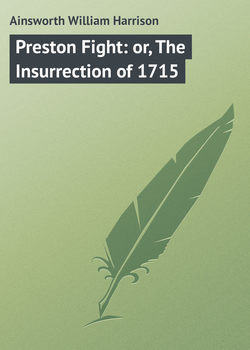Читать книгу Preston Fight: or, The Insurrection of 1715 - Ainsworth William Harrison - Страница 18
BOOK THE SECOND BAMBOROUGH CASTLE,
II. – PURSUIT
ОглавлениеOn arriving at Corbridge, the sheriff found that the carriage had taken the high road to Newcastle, the crossroad by Whittingham and Stamfordham being impracticable, and accordingly he and his troop galloped off in that direction; but when they reached the extensive moor that skirts the town, they discovered that a deviation from the direct course had been made on the left, and that the travellers had crossed, or attempted to cross the moor to Gosforth.
The road chosen was so bad, that it seemed almost certain the carriage would be found buried up to the axle-tree in a bog, and with that confident expectation the pursuers took the same route.
From appearances on the road, it was sufficiently clear that the heavy vehicle had been more than once partially engulfed, and could only have been extricated with difficulty – but it had reached firm ground at last, and had gone on to Gosforth.
About three miles further on the pursuers descried it slowly, rumbling on towards Blagdon Park. Cheered by the sight, they accelerated their pace, and shouting loudly as they went on, soon caused the carriage to stop.
Anxious to make the intended arrest without any appearance of violence, the sheriff ordered a halt of his followers, and rode up to the carriage, attended merely by Jesmond.
Lady Webb and the two women-servants inside had been greatly alarmed by the shouting of the pursuers and sudden stoppage of the vehicle, and Sir John thrust his head out of the window to see what was the matter.
Just then the sheriff came up, and saluting him formally explained his business. Sir John replied rather angrily, and declared in positive terms that there was no one in the carriage beside himself and Lady Webb and their two women-servants.
As the sheriff expressed a doubt, Sir John called to his man-servant to come down and open the door, and immediately got out.
“Now, Sir William – pray satisfy yourself!” he cried.
“I must trouble Lady Webb to alight – and the two women,” said the sheriff.
The injunction was obeyed by her ladyship, though not without strong expressions of displeasure.
As soon as they had all come forth, Jesmond got into the carriage, and looked under the seats, but found only trunks and boxes.
As he emerged with a crestfallen look, he was jeered by Sir John and her ladyship. The sheriff, too, blamed him for the blunder he had made.
“I am certain the Pretender is in the carriage, Sir William,” he said.
“Then find him,” cried the sheriff.
“Ay, find him, fellow, if you can,” added Sir John, derisively.
“He is here,” cried Jesmond, pointing to the footman, a tall, handsome young man.
An exclamation from Sir John was checked by her ladyship, who made a private sign to the footman to hold his tongue.
“You are not making a second blunder, I trust?” said the sheriff.
“No, no! rest easy, Sir William! All right now! I didn’t recognise him at first in his disguise. But now I’ll swear to him.”
“You will swear that I am the Chevalier de Saint George, whom you call the Pretender?” cried the footman.
“I will,” said Jesmond.
Again Sir John would have interfered, if a look from her ladyship had not kept him quiet.
“You need have no hesitation, Sir William,” said Jesmond. “I will take all consequences on my own head.”
“But your head is nothing,” rejoined the sheriff.
After a moment’s consideration, he told Sir John Webb he must turn back, and accompany him to Newcastle.
Sir John protested vehemently against the order, and declared it would put him to the greatest inconvenience.
“I cannot help that,” said the sheriff. “I own I am somewhat perplexed, but a great responsibility rests with me, and I am afraid of committing an error.”
“Then I warn you that you will commit a very great error indeed, if you take me to Newcastle,” said Sir John.
“We are wasting time here,” cried the sheriff. “Your ladyship will be pleased to re-enter the carriage,” he added, in a polite, but authoritative tone to Lady Webb – “and you, Sir John.”
The women servants followed, and the footman was about to shut the door, when the sheriff told him he must get in likewise.
Finding Sir John was about to resist the intrusion, Jesmond pushed the young man in, vociferating in a mocking voice:
“Room for his majesty, King James the Third!”
Irritated to the last point, Sir John would certainly have resented the insult if Lady Webb had not held him fast.
She could not, however, prevent him from putting his head out from the window, and shouting to the sheriff:
“Where is this farce to end, Sir William?”
“Most likely at the Tower of London,” was the sarcastic reply.
“Make no rejoinder, Sir John,” said Lady Webb. “You’ll have the laugh against him by-and-by.”
The coach was then turned round, and guarded by the troop of yeomen, proceeding slowly towards Newcastle.
